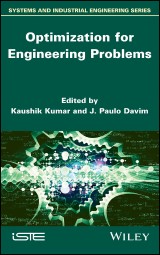Details

Optimization for Engineering Problems
1. Aufl.
|
139,99 € |
|
| Verlag: | Wiley |
| Format: | |
| Veröffentl.: | 10.07.2019 |
| ISBN/EAN: | 9781119644606 |
| Sprache: | englisch |
| Anzahl Seiten: | 188 |
DRM-geschütztes eBook, Sie benötigen z.B. Adobe Digital Editions und eine Adobe ID zum Lesen.
Beschreibungen
<p>Optimization is central to any problem involving decision-making in engineering. Optimization theory and methods deal with selecting the best option regarding the given objective function or performance index. New algorithmic and theoretical techniques have been developed for this purpose, and have rapidly diffused into other disciplines. As a result, our knowledge of all aspects of the field has grown even more profound.<br /> <br /> In Optimization for Engineering Problems, eminent researchers in the field present the latest knowledge and techniques on the subject of optimization in engineering. Whereas the majority of work in this area focuses on other applications, this book applies advanced and algorithm-based optimization techniques specifically to problems in engineering. </p>
<p>Preface ix</p> <p><b>Chapter 1. Review of some Constrained Optimization Schemes</b> <b>1</b><br /><i>Jonnalagadda SRINIVAS</i></p> <p>1.1. Introduction 1</p> <p>1.2. Constrained optimization problems 3</p> <p>1.3. Direct solution techniques 4</p> <p>1.3.1. Complex search method 4</p> <p>1.3.2. Random search techniques 6</p> <p>1.3.3. Method of feasible directions 7</p> <p>1.4. Indirect solution techniques 8</p> <p>1.4.1. Penalty function approach 8</p> <p>1.4.2. Multipliers method 10</p> <p>1.4.3. Simulated annealing search 10</p> <p>1.5. Constrained multi-objective optimization 12</p> <p>1.6. Conclusions 14</p> <p>1.7. References 14</p> <p><b>Chapter 2. Application of Flower Pollination Algorithm for Optimization of ECM Process Parameters</b> <b>17<br /></b><i>Bappa ACHERJEE, Debanjan MAITY, Arunanshu S. KUAR and Manoj K. DUTTA</i></p> <p>2.1. Introduction 17</p> <p>2.2. Flower pollination algorithm 21</p> <p>2.3. Optimization of the ECM process: results and discussions 23</p> <p>2.3.1. Experimental data and empirical models 24</p> <p>2.3.2. Single-objective optimization 25</p> <p>2.3.3. Multi-objective optimization 31</p> <p>2.4. Conclusion 34</p> <p>2.5. References 35</p> <p><b>Chapter 3. Machinability and Multi-response Optimization of EDM of Al7075/SIC/WS2 Hybrid Composite Using the PROMETHEE Method</b> <b>39<br /></b><i>Mohan Kumar PRADHAN and Brajpal SINGH</i></p> <p>3.1. Introduction 40</p> <p>3.1.1. Overview of metal matrix composites 41</p> <p>3.1.2. CNC EDM machine 42</p> <p>3.2. Literature review 49</p> <p>3.2.1. Metal removing rate 51</p> <p>3.2.2. Tool wear process 53</p> <p>3.2.3. Radial overcut 54</p> <p>3.2.4. Surface topography or surface finish 54</p> <p>3.3. Optimization process 55</p> <p>3.3.1. Analytic hierarchy process method 55</p> <p>3.3.2. PROMETHEE method 60</p> <p>3.3.3. Ranking relations for improved PROMETHEE 63</p> <p>3.4. Result and discussion 66</p> <p>3.4.1. The effect of EDM parameters on machining characteristics of EDM machine 66</p> <p>3.4.2. Optimization of EDM parameters 71</p> <p>3.5. Conclusion 71</p> <p>3.6. References 72</p> <p><b>Chapter 4. Optimization of Cutting Parameters during Hard Turning using Evolutionary Algorithms</b> <b>77<br /></b><i>Vahid POURMOSTAGHIMI and Mohammad ZADSHAKOYAN</i></p> <p>4.1. Introduction 78</p> <p>4.2. Genetic programming 83</p> <p>4.3. Particle swarm optimization 86</p> <p>4.4. Materials and methods 89</p> <p>4.4.1. Experimental setup 89</p> <p>4.4.2. Optimization procedure 90</p> <p>4.5. Results 92</p> <p>4.5.1. Experimental results 92</p> <p>4.5.2. GP results 93</p> <p>4.5.3. Optimization results 95</p> <p>4.6. Conclusion 96</p> <p>4.7. References 96</p> <p><b>Chapter 5. Development of a Multi-objective Salp Swarm Algorithm for Benchmark Functions and Real-world Problems</b> <b>101<br /></b><i>Sushant P. MHATUGADE, Ganesh M. KAKANDIKAR, Omkar K. KULKARNI and Vilas M. NANDEDKAR</i></p> <p>5.1. Introduction 101</p> <p>5.2. Salp swarm algorithm 105</p> <p>5.2.1. Single-objective salp swarm algorithm (SSA) 107</p> <p>5.2.2. Multi-objective salp swarm algorithm (MSSA) 109</p> <p>5.3. Constraint handling techniques 113</p> <p>5.4. Experimental results and discussion 114</p> <p>5.4.1. Single-objective unconstrained test functions 115</p> <p>5.4.2. Single-objective constrained test functions 117</p> <p>5.4.3. Multi-objective unconstrained test functions 120</p> <p>5.4.4. Multi-objective constrained test functions 122</p> <p>5.4.5. Real-world application 125</p> <p>5.5. Conclusion 127</p> <p>5.6. References 128</p> <p><b>Chapter 6. Water Quality Index: is it Possible to Measure with Fuzzy Logic?</b> <b>131<br /></b><i>Alexandre CHOUPINA, Elisabeth T. PEREIRA, Samara Silva SOARES, Poliana ARRUDA, Francis Lee RIBEIRO and Paulo Sérgio SCALIZE</i></p> <p>6.1. Introduction 131</p> <p>6.2. Data and methodology 134</p> <p>6.2.1. Data and description of the case study 134</p> <p>6.2.2. Parameters 135</p> <p>6.2.3. Water quality index 136</p> <p>6.2.4. Construction of the water quality index by fuzzy logic (WQF) 144</p> <p>6.3. Results and discussion 148</p> <p>6.3.1. Water quality analysis 148</p> <p>6.3.2. Index validation 150</p> <p>6.4. Conclusions 154</p> <p>6.5. Appendix 155</p> <p>6.6. References 156</p> <p>List of Authors 161</p> <p>Index 163</p>
<p><b>Kaushik Kumar</b> is Associate Professor in the Department of Mechanical Engineering at Birla Institute of Technology, Mesra, Ranchi, India. His research interests include quality management systems, optimization, unconventional machining, CAD/CAM, rapid prototyping and composites.</p> <p><b>J. Paulo Davim</b> is Professor at the University of Aveiro, Portugal. His research interests include mechanical and industrial engineering.</p>
Diese Produkte könnten Sie auch interessieren:

Strategies to the Prediction, Mitigation and Management of Product Obsolescence

von: Bjoern Bartels, Ulrich Ermel, Peter Sandborn, Michael G. Pecht

116,99 €
















